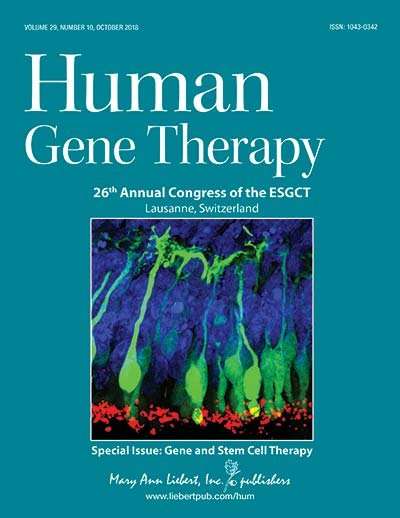Credit: Mary Ann Liebert, Inc., publishers
Mice with heart failure that were treated with AAV8-based gene therapy to deliver the protein urocortin 3 (UCn3) had increased blood levels of UCn3 over a 5-week period and improved heart function. The mice received a single injection of AAV8.UCn3 after cryoinjury to induce left ventricular heart failure and showed significant improvements in both systolic and diastolic heart function, as re-ported in an article published in Human Gene Therapy.
The article entitled "Urocortin 3 Gene Transfer Increases Function of the Failing Murine Heart," was coauthored by H. Kirk Hammond, Veterans Affairs (VA) San Diego Healthcare System and University of California, San Diego and a team of researchers from those institutions, Maastricht University, The Netherlands, and Institute for Molecular Cardiovascular Research, RWTH, Aachen, Germany.
The researchers presented data to support sustained elevation of plasma UCn3 levels and significantly improved left ventricular function (1.9 fold) and higher ejection fractions (32% relative increase) compared to mice who received a saline injection after cryoinjury.
"The outstanding group from the San Diego VA led by Dr. Hammond has continued to pioneer new viable gene therapy options for the extremely common problem of congestive heart failure," says Editor-in-Chief Terence R. Flotte, MD, Celia and Isaac Haidak Pro-fessor of Medical Education and Dean, Provost, and Executive Deputy Chancellor, Uni-versity of Massachusetts Medical School, Worcester, MA
Research reported in this publication was supported by the National Institutes of Health under Award Number P01 HL66941. The content is solely the responsibility of the au-thors and does not necessarily represent the official views of the National Institutes of Health.
More information: Dimosthenis Giamouridis et al, Urocortin 3 Gene Transfer Increases Function of the Failing Murine Heart, Human Gene Therapy (2018). DOI: 10.1089/hum.2018.103
Journal information: Human Gene Therapy
Provided by Mary Ann Liebert, Inc























